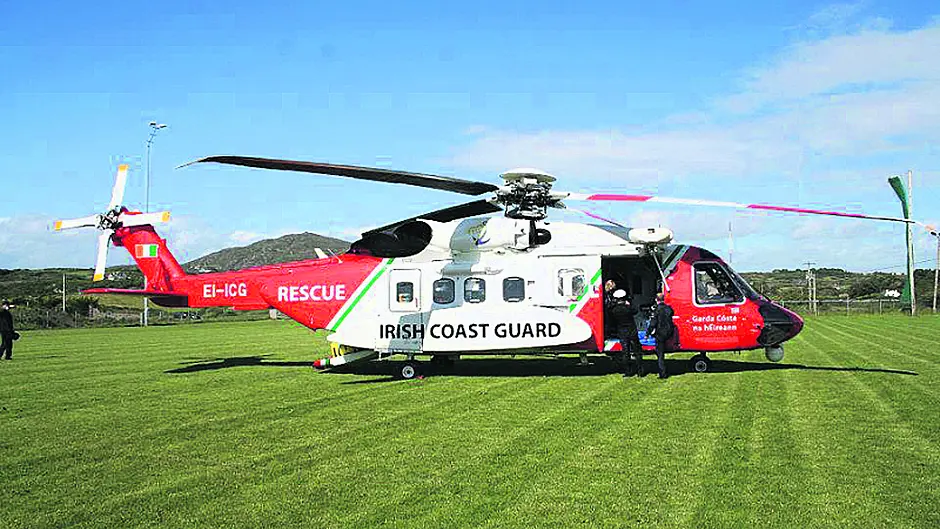Irish Coast Guard helicopters carried out 170 medevacs (medical evacuations) off the islands last year – up 23% on 2014.
IRISH Coast Guard helicopters carried out 170 medevacs (medical evacuations) off the islands last year – up 23% on 2014.
‘This island service is an important part in providing a sustainable quality of life for islanders off our west coast,’ the Coast Guard said in its end-of-year report.
There was also a 10% increase in people being swept into the sea from the shoreline.
Overall, the Coast Guard saw a record response for 2015, with it being particularly relevant to both the Shannon and Sligo SAR helicopters, which flew over 330 missions each.
All four helicopter bases completed over 1,000 missions for the first time since the helicopter service started in 1991.
The Coast Guard attributes the small rise in the number of incidents to a combination of increased tourism during the summer, more people taking part in water-based activities or outdoor pursuits, the additional work undertaken by the Coast Guard helicopters assisting the national ambulance service, particularly with medevacs of patients suffering from strokes etc, and the storms and high winds in December.
The Coast Guard believes that the rise in the number of incidents shows a greater willingness of the community to seek assistance early, which it says is to be welcomed.
The organisation has encouraged people to call 112 when they think they’re in trouble. ‘If you wait until you are in trouble, it might be too late. With the change in weather, we see a change in the calls and a change in conditions, but the message remains the same. If you do see someone in difficulty in the sea, on the shore, cliffs, lakes or rivers dial 112 or 999 and ask for the Coast Guard,’ it said this week.
Total incidents completed by the end of 2015 numbered 2,657 – a 1% increase on 2014 (2,628) which had been the busiest year since 1991.
The Coast Guard report also pointed out that incidents involving powered pleasure craft were down by 20%, amounting to 194, with merchant vessel incidents at 52 showing a 25% fall. There were 221 assists to sailing craft; a 4% increase, and fishing vessel incidents were down 1% (185) which were mainly tow-ins for engine failure.
However, there were 26 incidents involving aircraft, which is a 37% increase on the previous year.
Assistance was given to the HSE ambulance services on 514 occasions – a 50% increase from 2014. Additional to that figure, Coast Guard helicopters carried out 170 medevacs off the islands – up 23%.
‘The most significant rise has been assisting persons who got into difficulty on the shoreline, sometimes being swept into the sea by breaking waves,’ the Coast Guard added. ‘At 306 this is up 10% on last year. Mountain rescue accounted for 78 incidents and incidents on rivers and lakes show a 61% increase at 208,’ ther report pointed out. Some of this increase on rivers is accounted for by closer co-operation with fire authorities in Dublin, Cork and Limerick.
Another feature of the last number of years is the growing assistance given to An Garda Síochána in missing person searches in coastal and remote areas. With 232 missions in 2015, that represents a 5% rise.
Hoax calls had fallen by 58% but nuisance calls rose 10% to 2,549. Persons assisted, at 3,609, were down 10%, while lives saved, at 290, were up 12%.
Overall, the total incidents involved 75 body recoveries. Of the 28 fatalities encountered during missions in 2015, eight were of persons off the shoreline, two on mountain rescue calls, six in rivers and lakes, one in an aircraft accident, one in the UK area and 10 when assisting An Garda Siochana.
Coast Guard volunteer units were called out 1,290 times (2 %rise), RNLI lifeboat tasked 836 times (2% rise) and Community Rescue Boats 219 (4% rise) times.
There were 24 minor pollution incidents managed. The Coordination centres also broadcast 71,300 marine safety messages – a rise of 15%, and received 31,700 vessel traffic reports.
The increased number of traffic reports logged, particularly by small fishing and leisure vessels, was described as ‘very welcome’ and the Coast Guard encouraged anyone taking to sea to log a traffic report (in effect a sail plan) with the Coast Guard.
‘All boat users should also tell a responsible person ashore – in effect an emergency contact – where their craft is going, when its leaving, time due back and where, who is on board and, most importantly, what action to take when this estimated time of arrival back passes,’ the statement said.
‘This emergency contact ashore must take on this duty vigilantly and contact the Coast Guard immediately once they become concerned. Finally we would like to remind all who go on the water to don a lifejacket and keep it on,’ the report continued.
‘There is absolutely no excuse for not wearing a lifejacket and we would encourage every partner, friend or relation who knows a boater with no lifejacket to get one and have the boater wear it.’
Coast Guard director Chris Reynolds thanked all Coast Guard staff and volunteers who have responded throughout the year and also wished them all a safe 2016.









